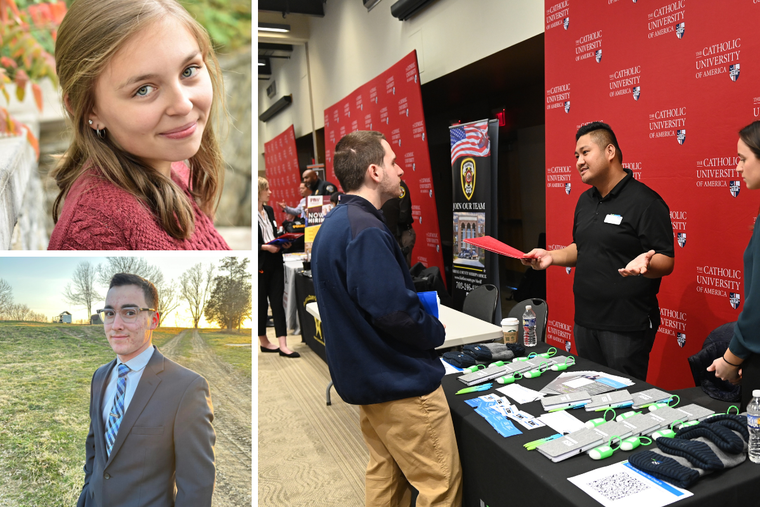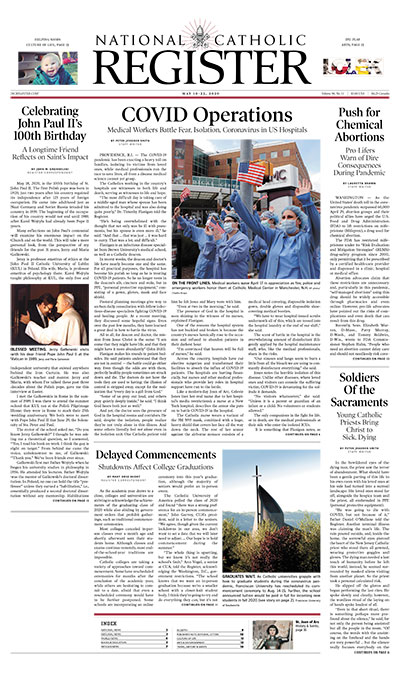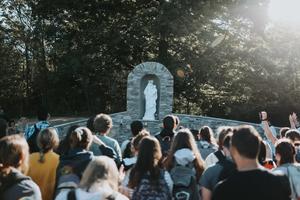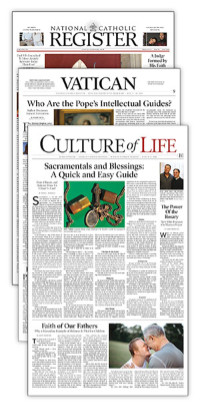Tips for College Students on Preparing for the Workplace
Career services help build résumés and confidence — and chart a future path.

After attending a classical liberal arts college for two years, Francis LaFata, 23, transferred to Franciscan University of Steubenville in Steubenville, Ohio, to pursue a more technical field.
He explored engineering, math and accounting for a year before a professor suggested he check out the university’s career office.
There, LaFata, who graduated with a tax accounting degree from the university this spring, took the professor’s advice and at the office took an online aptitude assessment, made alumni contacts and practiced interviewing. With his professors’ help, he found accounting-related internships where he used his skills.
“I wish I really had [gone to career services] a lot sooner because that would have helped, but I didn’t know that was an option,” said LaFata, who is originally from Scranton, Pennsylvania, and is currently looking for a job in the Denver area.
According to a Statista projection, 4.61 million higher-education degrees were expected to be granted to the U.S. Class of 2023. Like LaFata, many Catholic college and university graduates have found help in finding a job, additional education or service help from their school’s career services office.
Employers plan to hire almost 15% more 2023 college graduates than they did the previous year, according to a job-outlook report by the Bethlehem-Pennsylvania-based National Association of Colleges and Employers, a professional association connecting college career services professionals, university relations and recruiting professionals, and business solution providers.
While it’s too soon to know how this year’s graduates are faring, previous graduates of Catholic universities interviewed for this article show that 90% or more have had positive outcomes with jobs, internships, graduate school or other destinations six months after graduation.
For the Catholic universities featured in this article — all of which are included in the Register’s annual “Catholic Identity College Guide” — their graduates are gravitating toward careers in business, engineering, computer science, health care, cyber security and criminal justice, said the universities’ career services experts.
Employers and students are also showing more interest in sales and data analytics, said Ryane Cheatham, associate employer relations director at Washington, D.C.-based The Catholic University of America (CUA).
Psychology graduates are finding jobs in human resources, business and counseling, said Kevin Allan, director of career services at University of Mary in Bismarck, North Dakota.
Liberal arts graduates of University of Dallas in Irving, Texas, are finding jobs in business, teaching, health care, legal, nonprofit or tech and finance jobs, reported Gaby O’Neill, interim career services director.
Liberal arts skills of writing, communication and information synthesis are in demand among employers, said Mark McGuire, career services director at Franciscan University, who also noted that graduates are pursuing careers in diverse areas such as Christian ministry or the defense industry.
Along with communication skills, employers are also looking for social intelligence, McGuire said.
Tony Chiappetta, director of CUA’s Center for Academic Career Success, said, “It’s important that they talk with their adviser, so they make sure they’ve got a very good stable foundation for what they’re building on for their time here and their time after,” he said.
University career offices help students build that foundation as underclassmen and later develop job-search strategies that may include academic and career advising, mentoring, online and video resources, job-skills coaching, career fairs, networking opportunities and employer information. The assistance is available beyond graduation if needed, according to career services leaders interviewed.
Career planning begins as students are selecting their majors and minors. University of Dallas undergraduates have contact with the career office throughout their academic career as they discern both their career path and vocation, O’Neill said.
The university’s career office works with campus ministry to help students discern the spiritual aspects of choosing a career, she said.
“Many students think they know what they want to do but change their minds,” said Chiappetta. CUA freshmen and sophomores receive help choosing their major from career staff and faculty advisers.
Discovering a Vocation
Helping students discover their vocation and the gospel of work are at the core of what Harmel Academy of the Trades tries to do, said David Michael Phelps, president of the Grand Rapids, Michigan, academy. For men who still are discerning a trade career, the academy begun offering a gap-year program last year that includes spiritual discernment and hands-on experience in several trades.
Discerning college students also benefit from career fairs that give information about different fields, as well as from one-on-one advising, several of the career leaders said.
Career fairs that are university wide, or specifically for sales, business, medical engineering or other fields, also give CUA students opportunities to meet with job recruiters, Cheatham said.
As they approach graduation, juniors and seniors consult career services for job-search help, including with résumé writing, practice interviews, internships, mentorships and online job and employer resources. Allan said his office helps students with résumés, cover letters and interviewing.
“It’s sitting down and maybe getting help with interviewing skills and strategies, maybe learning questions they might be asked.”
The staff also help students use LinkedIn, Instagram and Facebook platforms in their job searches, he said, as well as Handshake, a job-search network of more than 12 million active student users, 1,400 college and university partners and 750,000 employers.
Job seekers need to know how to write and format their résumés not only for human but also AI screeners because some employers use Applicant Tracking Systems (ATS), McGuire said.
“We spend a lot of time trying to inform and help the student understand what they’re facing, from a technological point of view.”
Understanding technology is important, but because students also benefit from the experience of a mentor, University of Dallas is building a “culture of mentorship,” O’Neill said. The university offers mentorships for grads and first-generation students; and students also can shadow a professional on the job. “Any student or alum that we talked to who has graduated from the university has said, ‘This has benefited me.’”
The University of Mary also offers job shadowing and social events with employers, Allan said.
Job-seeking students benefit from networking with employers and alumni at CUA events, Cheatham said. “Recruiters as well as alums are willing to share the journey,” she said, adding that the university’s Center for Academic Career Success also helps students obtain internships and connect with employers.
Unlike traditional college students, Harmel Academy students interview for jobs when they start their education because they work and learn their trade as part of an apprenticeship, Phelps said. The academy has friendships with many machine shops in western Michigan and works with them to place students.
“In a way it’s a little less like an application to a college and more like an interview for a job.”
Students in Harmel’s two-year program start on a career track in the academy’s Machine & Systems Technology program and work part time at their apprenticeship as they complete technical and humanities studies. Academy graduates continue working at their jobs for several more years to finish their apprenticeships to become journeyman machinists, Phelps said.
Practical Experience
Another student who worked in her field while earning her degree is 2023 University of Mary nursing graduate Mary Favorite.
In June, Favorite, 22, of Minnetonka, Minnesota, started her job in the emergency center at Methodist Hospital in St. Louis Park, Minnesota, where last summer she interned and during her senior year did a shorter clinical assignment. A university course on transitioning to professional nursing especially helped Favorite develop interview questions.
“The nursing shortage is incredible right now,” she said, “and so they really wanted to emphasize that we have the opportunity ... to search for the environment that we best fit into.”
- Keywords:
- career
- catholic college students











